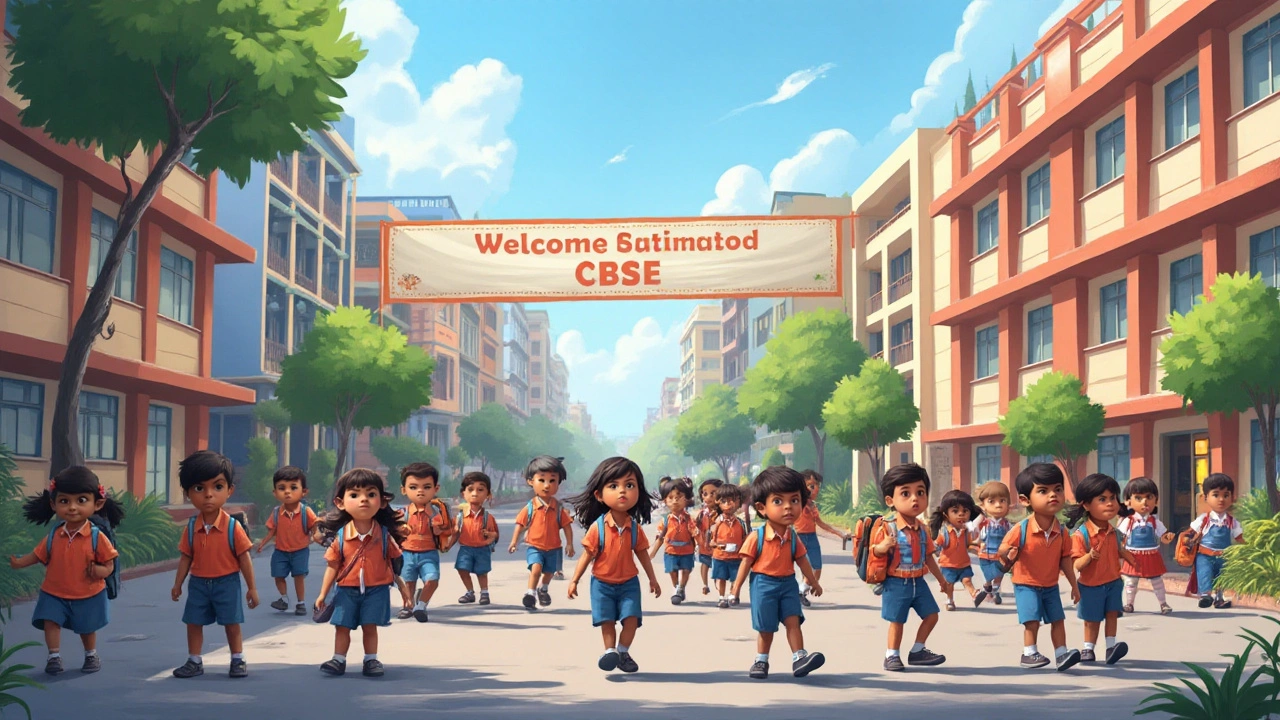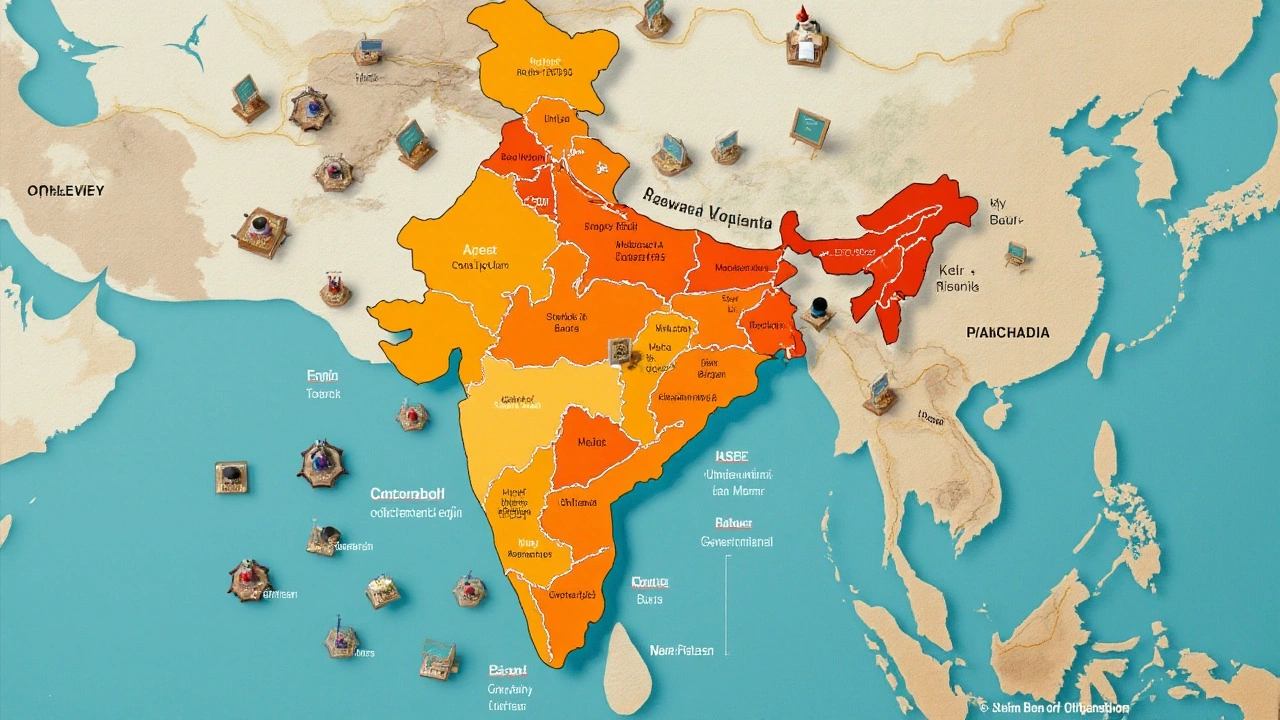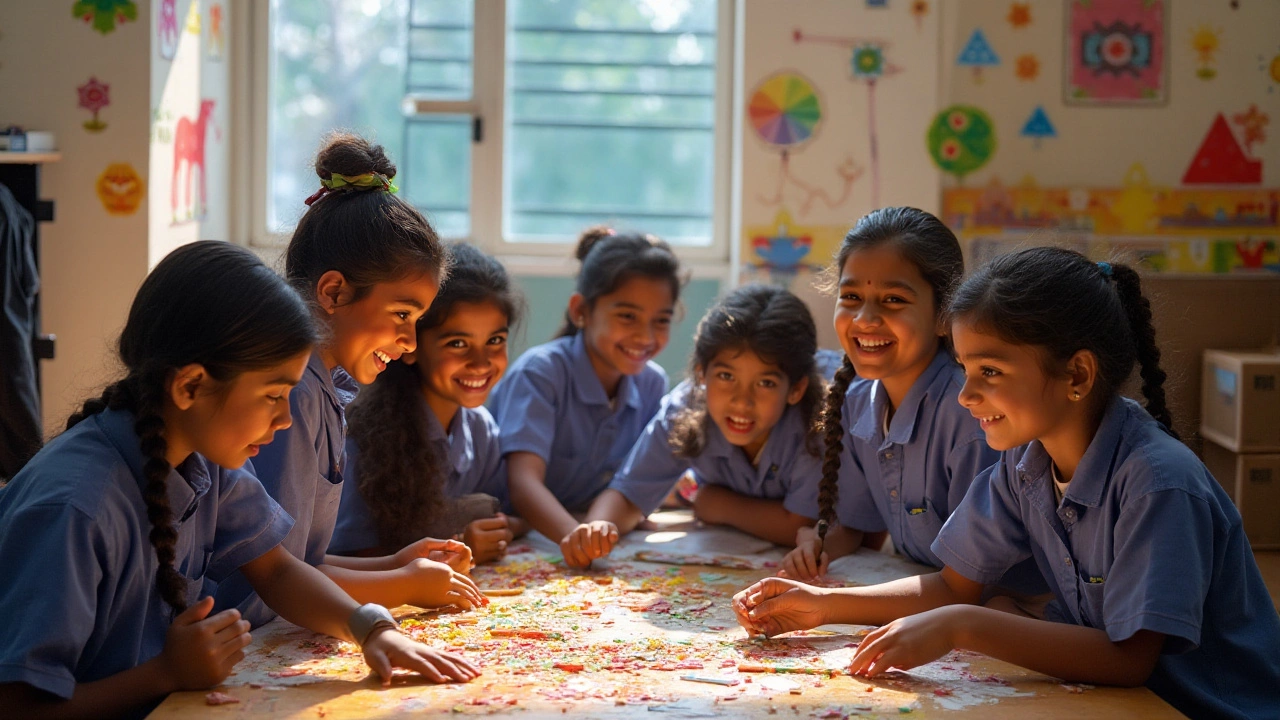Which Indian State Tops the Chart for CBSE Schools?

The Central Board of Secondary Education (CBSE) is a widely recognized and esteemed educational board in India. Known for its structured curriculum and emphasis on holistic education, CBSE schools are spread across the country, fostering learning environments that nurture academic and extracurricular prowess.
Understanding the distribution of these schools across various states can shed light on educational priorities and growth dynamics. Delving into this subject can reveal intriguing patterns, particularly which state currently leads with the most CBSE schools. Whether you're a parent looking to enroll your child or simply a curious education enthusiast, the factors that contribute to this distribution are both captivating and informative.
- Understanding CBSE's Role in India
- Top States with Maximum CBSE Schools
- Process of CBSE Affiliation
- Reasons for CBSE Popularity
Understanding CBSE's Role in India
The Central Board of Secondary Education, commonly known as CBSE, plays a pivotal role in shaping the educational landscape of India. Established in 1929, CBSE has consistently focused on providing a balanced education that not only adheres to academic rigor but also fosters a sense of holistic growth among students. Its structured curriculum is crafted to promote an understanding of subjects in a way that encourages critical thinking rather than rote learning. This approach is what sets CBSE apart and makes it appealing to a broad spectrum of parents and students across the nation.
CBSE ensures a uniform standard of education across its affiliates, which span not just India but extend internationally to several schools in over 25 countries. This standardization is a strong plus for families that move across states or abroad, providing their children with continued education without disruption. It is particularly noteworthy that the current CBSE syllabus is designed to be application-oriented, aligning textbook learning with real-world contexts, which helps students prepare for competitive exams like IIT-JEE, NEET, and more. This is a major driving force behind the popularity of CBSE schools.
Looking into the details of school statistics, the CBSE board involves an impressive network of over 27,000 schools, both public and private. These institutions adhere to guidelines that ensure quality teaching, infrastructure, and examination execution, which is crucial not only for maintaining credibility but also for students' development. With its affiliation process detailed yet accessible, aspiring schools undergo stringent scrutiny to meet the board's requirements, promoting a level of trust amongst parents.
A vital aspect of CBSE’s role in Indian education is its focus on co-curricular and extracurricular activities. Schools under this board are encouraged to include diverse activities ranging from sports to arts, fostering a nurturing environment that balances education with physical and creative pursuits. This is grounded in the belief that academic success should not overshadow the benefits of developing social skills, teamwork, and creativity.
Former chairman of CBSE had stated,
"Our aim is not only to educate but to instill values and ethics in children. We believe in creating individuals who are prepared not just for exams, but for life."This ethos resonates throughout the board’s policies and pedagogical approaches, reinforcing its commitment to comprehensive education.
In today's educational scene, CBSE's sustained efforts to evolve and update its policies are noteworthy. It frequently revises its syllabus to keep pace with changing educational needs and global trends, ensuring that students are globally competitive yet rooted in core Indian values. From implementing AI courses to reaffirming traditional subjects, CBSE is forging a path that blends the old with the new.

Top States with Maximum CBSE Schools
India, with its vast regions and culturally diverse states, exhibits a fascinating education landscape when it comes to the distribution of CBSE schools. These institutions are renowned for their robust curriculum, which places a significant focus on science and mathematics while also encouraging extracurricular engagement. Considered markers of high-quality education, CBSE schools are particularly prominent in urban areas due to the demand from parents who aim for comprehensive academic proficiency for their children. Among the states, some emerge towering over others in terms of CBSE school counts, a testament to their commitment to these educational ideals.
Uttar Pradesh, with its large populace, undeniably takes a prominent place in the list of states with a significant number of CBSE affiliated schools. The blend of urbanization and population density creates a fertile ground for educational institutions targeting a national curriculum. Maharashtra follows closely, driven by cities like Mumbai and Pune, where education is highly prioritized, and parents seek the best for their children. Tamil Nadu, with Chennai serving as an educational hub, also features prominently. The diverse features of each state contribute differently to school statistics in unique ways, making the education landscape as diverse as the nation itself.
"The consistent growth of CBSE schools in urban regions speaks volumes about their popularity and the trust parents place in them," says Dr. R. K. Sharma, an education policy expert.
The southern states of Kerala and Karnataka make noticeable contributions too, where the emphasis on quality education has pervaded for decades. Kerala, notably with its high literacy rates, often incorporates CBSE curriculum to supplement its already strong regional educational systems. Meanwhile, Karnataka, bolstered by the educational infrastructure of Bangalore, also stands as a key player. Each of these states displays a remarkable commitment to educational accessibility, reflected in the number of CBSE institutions within their boundaries.
Other states such as Haryana and Punjab, although smaller when it comes to geographic size, represent another fascinating case. Their rural-urban educational strategies increasingly incorporate CBSE schools as a means to bridge educational gaps. The adjoining nature of these states often leads to cooperative educational frameworks, reinforcing the reach and influence of the CBSE curriculum further. Such widespread adoption underscores the flexibility and appeal that the CBSE framework holds, responding aptly to diverse regional needs.
A bird's eye view of the data might reveal that the popularity of CBSE schools translates not just into numbers, but also embodies a national trend that continually expands and adapts. There has been a commendable push across various regions to elevate educational standards and benchmark them against a national standard, often reflecting regional aspirations tied to national progress. The aggregated demand across states only amplifies this trend, evolving the educational spectrum dynamically with each passing year.

Process of CBSE Affiliation
The affiliation process of the Central Board of Secondary Education (CBSE) is a comprehensive procedure designed to ensure educational institutions meet the board’s high standards. Schools seeking affiliation must navigate a series of steps, demonstrating their capability to effectively deliver the CBSE curriculum and uphold its values. This involves a rigorous assessment of various aspects ranging from infrastructure to educational quality, and operational guidelines.
Initially, a school interested in obtaining CBSE affiliation must submit an online application. This application includes detailed information about the institution’s infrastructure, student enrollment, faculty qualifications, and available resources. The board evaluates these parameters to ensure that the school has the capacity to maintain a conducive learning environment. Notably, schools must meet specific land and building requirements, as prescribed by CBSE, to ensure that students have adequate space and facilities.
The application process is followed by a meticulous inspection by a CBSE-appointed inspection committee. The committee visits the school to verify the facts stated in the application. The inspection is crucial as it delves deeper into the school’s adherence to safety norms, curricular support, and co-curricular activities. The committee also evaluates the school’s commitment to fostering inclusive education. An inspection report is generated by the committee, which plays a pivotal role in the final decision-making process regarding affiliation.
A significant factor in the whole process is the school's adherence to CBSE's educational and ethical guidelines. Schools are expected to maintain transparency and honesty throughout the affiliation journey. Any discrepancies or false claims can lead to the rejection of the application, and, in extreme cases, punitive action against the school. Moreover, CBSE emphasizes the professional development of teachers. Hence, schools must ensure that their faculty members are regularly trained and updated with the latest educational methodologies.
Successful affiliation is not the end of the road; it entails a continuous relationship with the CBSE. Schools must comply with periodic audits and reviews by the board to maintain their affiliated status. These evaluations ensure that schools remain committed to quality education. To guarantee continuous growth, CBSE provides support in various forms such as workshops, seminars, and other educational tools.
"Affiliation ensures holistic growth and alignment with the national curriculum framework. Schools benefit from structured support that aids in maintaining educational excellence," says a CBSE representative.
The affiliation process is designed to promote and maintain educational quality across the vast landscape of India's educational system. The stringent measures ensure schools aligned with CBSE provide an enriching environment, preparing students not only for academics but for life itself. With rigorous standards and continuous support, affiliated schools become part of a legacy that prioritizes student welfare and educational integrity, catering to millions of students across the nation.

Reasons for CBSE Popularity
The Central Board of Secondary Education, widely favored across India, owes its popularity to several compelling reasons. Firstly, the CBSE's curriculum is structured to provide a uniform educational framework, which simplifies transitions for students moving between states or even overseas. This national uniformity in the curriculum aids not only students but also schools intending to upgrade their educational standards. The board places a strong emphasis on streamlining subjects such as Science and Mathematics, thus acting as a preparatory foundation for competitive exams like JEE and NEET. These exams determine entry into esteemed colleges and universities, making a CBSE education attractive to ambitious students.
Another key factor is the board’s progressive approach to curricular activities, which proves beneficial in fostering a comprehensive educational environment. CBSE schools encourage a balance between academics and extra-curricular activities, aligning with modern educational philosophies that stress holistic development. Such encouragement comes along with a growing network of inter-school competitions supported by the board, further adding to its widespread appeal. Remarkably, CBSE has a merit-based examination pattern, which employs an effective methodology to assess each student’s performance more accurately than traditional rote learning systems.
Moreover, the board's affiliation procedures are considered both transparent and efficient, enticing schools to seek CBSE recognition. The allure of affiliation lies partly in the esteemed reputation of CBSE in delivering high-quality education. Notably, parents often regard CBSE affiliated institutions as benchmarks of excellence, enhancing the desirability of these schools significantly. This societal perception, coupled with the wide acceptance of the CBSE certificate worldwide, amplifies its appeal among parents looking to secure educational and professional opportunities for their children.
According to the Times of India, "CBSE's updated focus on developing critical thinking rather than rote learning prepares students better for future challenges. This forward-thinking approach has revolutionized modern-day schooling in India."
CBSE has also been pioneering changes to remain relevant and efficient in the contemporary educational landscape. The incorporation of digital learning resources, continuous updates to syllabi to include modern subjects, and a keen focus on life skills have made the CBSE eminently adaptable over the years. This adaptability keeps the curriculum updated with the latest educational trends and workplace demands, ensuring students receive an education fitting the era. Additionally, the numerous training programs and workshops organized by CBSE for teachers ensure that educators are equipped with the best methodologies to impart knowledge effectively.
The outreach and ubiquity of CBSE schools cannot be ignored, as they span urban and rural areas alike, making education more accessible. The board's proactive role in providing educational resources and its mission to enhance learning regardless of geographical constraints has strengthened its stronghold across the nation. CBSE conducts various initiatives to promote educational access for all, bolstering this popularity. Such values resonate widely and endear the board to both public and private sectors, prompting schools to continue affiliating under its esteemed guidance.